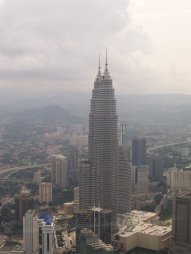German industry causes more environmental and health damage than any other country in the European Union, amounting to billions of euros each year, according to a new EU report.
The study by the European Environment Agency (EEA) released Thursday ranked Germany ahead of other serious polluters like Britain, France or any eastern European countries.
The agency, which used 2009 numbers in factors including CO2 emissions, said that pollution from facilities like steelworks and power plants caused between €102 billion and €169 billion in health and environmental costs across the European Union.
AIR BERLIN NEEDING INVESTORS
Air Berlin Chief Hartmut Mehdorn has already held talks with Etihad Airways, based in the United Arab Emirates, and Chinese holding company HNA, the main shareholder of Hong Kong Airlines, the Sueddeutsche Zeitung daily said.
One option is the "selling of a large amount of Air Berlin shares," the daily said, without citing its sources.
Air Berlin's founder, Joachim Hunold, had always ruled out the option of seeking foreign investors but new boss Mehdorn appears to be pursuing a different strategy.
Company shares were down 2.64 percent at €2.58 in early trading in Frankfurt on the news.
The airline, which relies heavily on transporting German tourists, ran into heavy turbulence in 2008 after years of soaring growth and expansion.
The firm has suffered more than its competitors from external factors, such as the political turmoil in North Africa since the beginning of the year.
It has also been hit hard by rising fuel costs, the introduction of an aviation tax in Germany and uncertainties over the economy.
TOYOTA AND BMW IN 'GREEN' DEAL TALKS
Japanese car giant Toyota is in talks with BMW over a green alliance. Under the deal, the German automaker would provide diesel engines for Toyota vehicles, while Toyota would share its hybrid technology. It would mark Toyota's second green-technology tie-up with a major foreign automaker, following its agreement in August to develop hybrid-vehicle systems with Ford of the United States.
A Toyota spokesman said the report was based on "speculation" and refused to comment further.
Under the proposed arrangement, BMW would provide diesel engines for Toyota's passenger vehicles, most likely medium-sized cars of around 2,000cc to be sold in Europe, Nikkei said.
BMW, which inked a deal with France's PSA Peugeot Citroen Group in late 2010 to jointly develop hybrid systems for subcompacts, would be able to expand its lineup, the daily said.
Toyota has struggled to use its hybrids to expand its market share in Europe in a region where roughly 60 percent of passenger cars are powered by diesel engines, the daily said. Demand for diesel vehicles is forecast to grow since such engines are seen as an effective way to cut carbon dioxide emissions, and technological advances in the field are essential as emission regulations become tougher.
With the strong yen hurting the price competitiveness of its hybrids, Toyota was aiming to improve the marketability of its diesel vehicles by procuring engines from BMW, the daily added.
BERLIN BRANDENBURG AIRPORT NEARING COMPLETION
The new Berlin airport, Brandenburg, is expected to start operations in a little more than six months, has entered a key test phase and authorities are determined to figure out problems ahead of the June 3, 2012 opening. It will replace Schoenfeld and Tegel creating one of the largest airports in the world.
One thing is sure, said Manfred Körtgen, the head of Willy Brandt Airport said. The date will not be rolled back, Der Tagesspiegel newspaper reported on Saturday.
Körtgen said the airport is undergoing a massive series of tests and checks to make sure it can handle the traffic, luggage and passengers on the first day.
Located in a southeast corner of Berlin, the airport is currently the largest construction site in eastern Germany and has 5,500 workers hammering and digging away to get it ready. Practice run throughs will take place on Tuesdays and Thursday, Körtgen said.
Beginning in February, thousands of volunteers will play the role of passengers and help airport officials figure out what works and doesn’t.
The new airport has come under extensive criticism – and been the subject of many protests – by neighbours fearing noise and pollution problems.
The airport has a capacity of 27 million passengers per year and officials are expecting 23.5 million already in its first year.





No comments:
Post a Comment